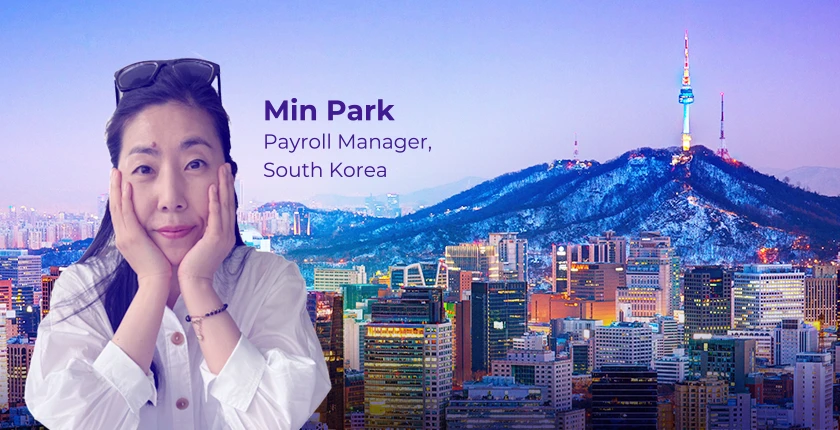Foreign Direct Investment (FDI) pledges to South Korea surged by 7.5%, year-over-year (YoY), in 2023 – the third consecutive year of growth, reaching an all-time high driven by the strong performance of the chip, battery and transportation sectors. By May 2023, the number of foreign nationals working in South Korea was also reported to have reached an all-time high of 923,000 – a notable 10% YoY increase.
Expansion of South Korea payroll solutions
As a result of rising inward investment, demand for the expansion of global payroll solutions into South Korea continues to increase significantly, keeping Min Park, South Korean Payroll Manager at Safeguard Global, and her team exceptionally busy.
“Beyond increasing interest from international companies in operating within South Korea, a key reason for sharp growth trajectory at Safeguard Global,” Min notes, “is that payroll is seldom operated here as a standalone function. It is typically either part of an HR or Finance function, if in-house, or offered as part of an HR of accounting service, when provided by a partner. This standalone company specialism is not easy to find in South Korea. As such, our offering is extremely popular with companies who already have established regional support for finance and/or HR and just require an in-country extension to their global payroll.”
The advantages of payroll specialists
Consequently, payroll professionals are also not easy to find. When Min contemplated a move from a broader in-house finance role to specialize in payroll, she understood that the learning curve would be steep. “In my previous position, I had broad but not deep technical knowledge, as the role requirement spanned many facets of finance, including payroll. In specializing, I have developed a granular level of working knowledge around income and residency taxes, other statutory payments and employment protocols, while maintaining a real-time pulse on any potential future changes.”
“Developing deep expertise,” Min continues, “and being on a continual learning curve is a really rewarding career journey - at whatever stage of life you are. I chose to move after 20 years as a generalist to become a specialist, but I also have team members who have sought out this opportunity at an early stage in their career as they knew it would set them up for life – progressing swiftly through gaining deeper and deeper knowledge of this payroll specialism.”
With all her team members having a background in general finance or HR prior to their current payroll specialization, Min notes that this provides an additional benefit. “Our broader background experience helps with our communication with clients, as it provides for a much greater contextual understanding of things that matter to our clients when talking to them about paying their workers within South Korea.” This stops short of offering advice or guidance in either finance or HR, however, as you must be an expert in your field to offer advisory services, Min clarifies. “We can offer advice as experts within payroll and have a separate team within the company who can provide this advice and guidance within HR, but there are clear demarcations between the two teams.”
Keeping up with South Korea payroll legislation and compliance
One of the key areas of South Korea payroll on which the team regularly provides advice is on tax reporting responsibilities. With most of their clients being international companies for whom, in the majority of their payrolling countries, the employee is responsible for the payment of their own taxes, the protocols in South Korea are unusual. “In South Korea,” Min notes, “the reverse is true: employers have a responsibility to not just withhold and remit payroll taxes monthly to the government (for Class A income), but to finalize the employee’s tax liability and issue them with a tax settlement certificate at the end of the tax period. Additionally, our legislation requires specific formatting of all associated documentation (including payslips). With our systems set up to ensure compliance by meeting all current requirements – which are instantly updated in line with legislative change – this provides significant time and cost savings for our clients in that they do not need to design and redesign their systems, when regulations change, to accommodate what is pretty much an exception to the global payroll filing norms.”
Reflecting on her role as a specialized South Korea payroll leader, Min finds it “a very satisfying field of work - with no greater feeling of satisfaction than when we successfully complete a transition or payroll transformation and evolve to become a true partner to our client. The work is also characterized by ownership and independence, in that you are wholly responsible for the payrolls you manage rather than being a contributor to a wider team effort when payroll sits within either finance or HR. That also makes you 100% accountable, however, as you need to have all the answers to client queries around status, activities, outcomes, etc. You need to thrive on this level of responsibility. These are the characteristics that make for success as a payroll profession and form the DNA of our team in South Korea.”
Get in touch with our team of experts
Have any questions or concerns? We’re ready to partner with you and deliver managed payroll services that align with your specific business needs.
